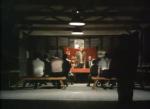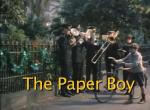AustLit
Latest Issues
AbstractHistoryArchive Description
In 1932, eleven-year-old Joe Riordan gets a job to help support his family after his father loses his factory job. Working on the streets, Joe mixes with all sorts of people, most he never really knew about. They range from the unemployed and other paper boys to ex-servicemen, evangelists, buskers, and communist agitators, all fighting for survival. Joe's father goes to the pub to escape, using what little money Joe has earned. Joe's disappointment in his father turns increasingly to tension as Joe becomes interested in communism. After a fight, Joe runs away and starts living on the streets. He toughens up to survive and to earn enough money for his mother, but when he becomes ill, he has to return home. His father has stopped drinking, and Joe and his father reconcile. When Mr Riordan finally gets a job, the family is able to celebrate with a belated Christmas.
(Source: Australian Screen)
Notes
-
Telemovie.
-
The trailer for this episode is avialable to view via YouTube: http://www.youtube.com/watch?v=GpuhSP0-6Lc (Sighted: 7/9/2012)
Publication Details of Only Known VersionEarliest 2 Known Versions of
- 1930s





